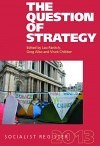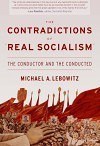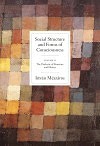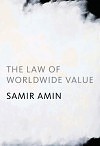Socialism

Socialist Register 2013 seeks to explore and clarify strategy for the Left in the light of new challenges and new opportunities. Socialists today have to confront two realities: that they cannot avoid the question of reforms and a gradualist path out of capitalism, and that the organizational vehicles for socialism will most likely have to abide by different structures and principles than those that dominated left politics in the 20th century. Though solutions are not obvious, Socialist Register 2013 interrogates these dilemmas and critiques some unhelpful radical thinking that obstructs the reconsideration of socialist strategy for the 21st century. It asks, how have the occupations of public squares around the world changed the political scene? What are the most useful forms of political organization in the new conjuncture? Which features of past organizational models should be retained, and which discarded? | more…
The transition from capitalism to socialism is the most difficult problem of socialist theory and practice. To add to this the question of ecology might therefore be seen as unnecessarily complicating an already intractable issue. I shall argue here, however, that the human relation to nature lies at the heart of the transition to socialism. An ecological perspective is pivotal to our understanding of capitalism’s limits, the failures of the early socialist experiments, and the overall struggle for egalitarian and sustainable human development | more…

In this concise volume, noted scholar and economist Michael A. Lebowitz considers the legacy of twentieth century socialist societies, or what some have termed “real socialism.” While these societies were able to claim major achievements in areas from health care to education to popular culture, they nonetheless met limited success in eroding what Marx called the “opposition of the worker as direct producer and the proprietor of the means of production.” That this opposition between workers and managers continued to exist in one form or another under “real socialism” means that, according to Lebowitz, a crucial aspect of the socialist project was lost. | more…

Heinrich’s modern interpretation of Capital is now available to English-speaking readers for the first time. It has gone through nine editions in Germany, is the standard work for Marxist study groups, and is used widely in German universities. The author systematically covers all three volumes of Capital and explains all the basic aspects of Marx’s critique of capitalism in a way that is clear and concise. | more…
The victory of the No vote in the Venezuelan constitutional reform referendum in December is being treated by Washington as a major defeat for Chávez’s efforts to promote a socialism for the twenty-first century in Venezuela. But the opposition to the Bolivarian Revolution was so aware of its own weaknesses that it adopted as its final slogan “Chávez, Yes; Reform, No.” The defeat of the constitutional reform was guaranteed by the fact that 44 percent of the population, many of whom had supported Chávez previously, chose not to vote. This may simply be due to the fact that the proposed constitutional reforms were enormously complex with changes in 69 articles. But it is also true that a propaganda campaign authored and choreographed by Washington and the CIA, and implemented by the Venezuelan elites who control the private media, had a considerable effect in blocking the reform effort. | more…

Revolutionary Doctors gives readers a first-hand account of Venezuela’s innovative and inspiring program of community healthcare, designed to serve—and largely carried out by—the poor themselves. Drawing on long-term participant observations as well as in-depth research, Brouwer tells the story of Venezuela’s Integral Community Medicine program, in which doctor-teachers move into the countryside and poor urban areas to recruit and train doctors from among peasants and workers. Such programs were first developed in Cuba, and Cuban medical personnel play a key role in Venezuela today as advisors and organizers. This internationalist model has been a great success—Cuba is a world leader in medicine and medical training—and Brouwer shows how the Venezuelans are now, with the aid of their Cuban counterparts, following suit. | more…
Seventeen years ago, in 1990, I began an essay with a poem of Bertolt Brecht. It was a poem about a man in Europe in the Middle Ages who put on “things that looked like wings,” climbed to the roof of a church, and tried to fly. He crashed, and the bishop who passed by said, “No one will ever fly.” | more…

In The Dialectic of Structure and History, Volume Two of Social Structure and Forms of Consciousness, István Mészáros brings the comprehension of our condition and the possibility of emancipatory social action beyond the highest point reached to date. Building on the indicatory flashes of conceptual lightning in the Grundrisse and other works of Karl Marx, Mészáros sets out the relations of structure and agency, individual and society, base and superstructure, nature and history, in a dialectical totality open to the future. | more…

In his new extensively revised and expanded edition of this book, Samir Amin suggests new approaches to Marxian analysis of the crisis of the late capitalist system of generalized, financialized and globalized oligopolies following on the financial collapse of 2008. Considering that Marx’s Capital, written before the emergence of imperialism as a decisive factor in capitalist accumulation, could provide no explanation for the persistent “underdevelopment” of the countries of the “global South,” Amin advances several important theoretical concepts extending traditional Marxian views of capitalist evolution. | more…
I wrote some time ago that “Harry Magdoff is a great teacher and an indomitable combatant. His contributions to socialist theory-on imperialism and monopolistic developments, as well as on the vital role of planning for any viable society of the future—are of a truly lasting importance.” | more…

The theory and practice of revolutionary social transformation, Bruce Brown argues, cannot rest content with the exclusive emphasis of traditional Marxism on world-historic processes and the struggle of the working classes for their collective emancipation. He views the experience both of the backsliding of revolution in the Soviet Union and Eastern Europe, and of the manipulative integration of the population of the West into consumer capitalism, as seen at the turning point years of the early 1970s. Brown argues that Marxism needs to rediscover the specifically subjective, psychological dimensions of the revolutionary process in their relation to the objective patterns in history. | more…

This intriguing work deals with the plight of the alienated individual, estranged from humanity and the surrounding world. It examines such questions as: Why do writers like Kafka, Thomas Wolfe, Rilke, and the existential philosophers, who portray man as a stranger in the world, have such a strong appeal? Is estrangement limited to individual cases or has it become a universal fate? Is alienation a consequence of the triumph of the machine? Is it caused by the increasing complication of our political life and by the growing separation between leaders and masses? Is it characteristic of the human condition, or is it a specific development of modern society? Should mankind resign itself to alienation, or can it be overcome, conquered? | more…







